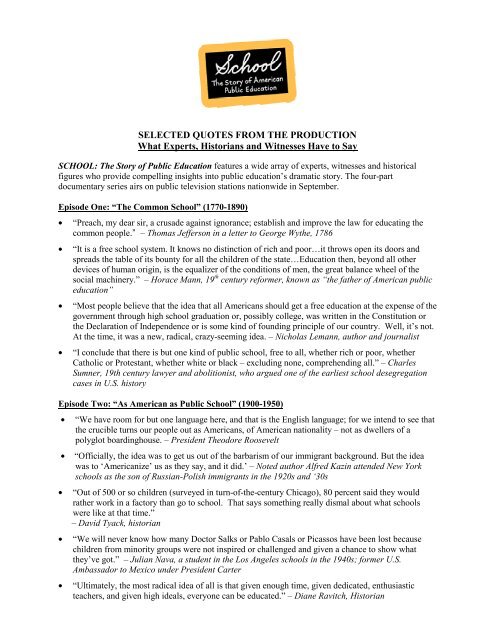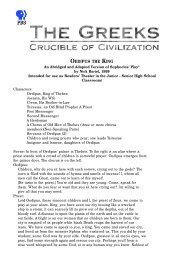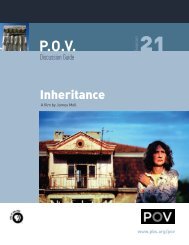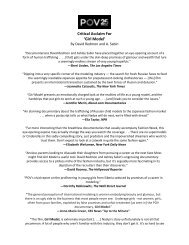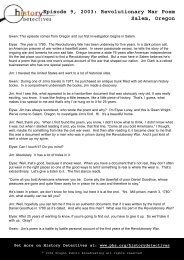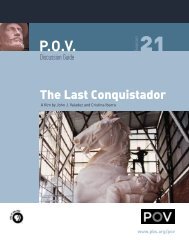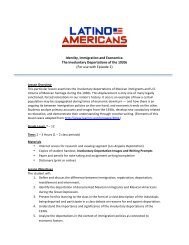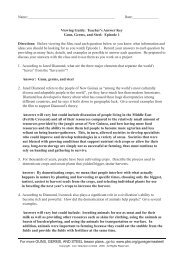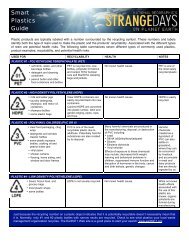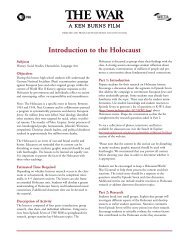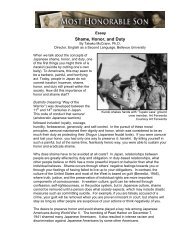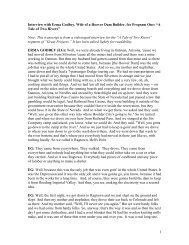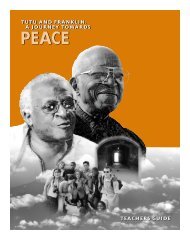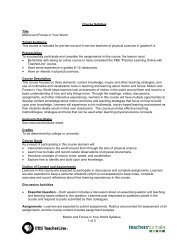SELECTED QUOTES FROM THE PRODUCTION - PBS
SELECTED QUOTES FROM THE PRODUCTION - PBS
SELECTED QUOTES FROM THE PRODUCTION - PBS
You also want an ePaper? Increase the reach of your titles
YUMPU automatically turns print PDFs into web optimized ePapers that Google loves.
<strong>SELECTED</strong> <strong>QUOTES</strong> <strong>FROM</strong> <strong>THE</strong> <strong>PRODUCTION</strong>What Experts, Historians and Witnesses Have to SaySCHOOL: The Story of Public Education features a wide array of experts, witnesses and historicalfigures who provide compelling insights into public education’s dramatic story. The four-partdocumentary series airs on public television stations nationwide in September.Episode One: “The Common School” (1770-1890)• “Preach, my dear sir, a crusade against ignorance; establish and improve the law for educating thecommon people.” – Thomas Jefferson in a letter to George Wythe, 1786• “It is a free school system. It knows no distinction of rich and poor…it throws open its doors andspreads the table of its bounty for all the children of the state…Education then, beyond all otherdevices of human origin, is the equalizer of the conditions of men, the great balance wheel of thesocial machinery.” – Horace Mann, 19 th century reformer, known as “the father of American publiceducation”• “Most people believe that the idea that all Americans should get a free education at the expense of thegovernment through high school graduation or, possibly college, was written in the Constitution orthe Declaration of Independence or is some kind of founding principle of our country. Well, it’s not.At the time, it was a new, radical, crazy-seeming idea. – Nicholas Lemann, author and journalist• “I conclude that there is but one kind of public school, free to all, whether rich or poor, whetherCatholic or Protestant, whether white or black – excluding none, comprehending all.” – CharlesSumner, 19th century lawyer and abolitionist, who argued one of the earliest school desegregationcases in U.S. historyEpisode Two: “As American as Public School” (1900-1950)• “We have room for but one language here, and that is the English language; for we intend to see thatthe crucible turns our people out as Americans, of American nationality – not as dwellers of apolyglot boardinghouse. – President Theodore Roosevelt• “Officially, the idea was to get us out of the barbarism of our immigrant background. But the ideawas to ‘Americanize’ us as they say, and it did.’ – Noted author Alfred Kazin attended New Yorkschools as the son of Russian-Polish immigrants in the 1920s and ‘30s• “Out of 500 or so children (surveyed in turn-of-the-century Chicago), 80 percent said they wouldrather work in a factory than go to school. That says something really dismal about what schoolswere like at that time.”– David Tyack, historian• “We will never know how many Doctor Salks or Pablo Casals or Picassos have been lost becausechildren from minority groups were not inspired or challenged and given a chance to show whatthey’ve got.” – Julian Nava, a student in the Los Angeles schools in the 1940s; former U.S.Ambassador to Mexico under President Carter• “Ultimately, the most radical idea of all is that given enough time, given dedicated, enthusiasticteachers, and given high ideals, everyone can be educated.” – Diane Ravitch, Historian
Episode Three: “Equality” (1950-1980)• “I had playmates of all nationalities…Native Americans, Caucasians, Hispanic children. Whenschool started, we would go in opposite directions. Of course, your playmates you played with everyday wanted to know, well, why don’t you go to school with us?” -- Linda Brown Thompson, plaintiff,Brown v. Board of Education• “Their sense was that we are going into an environment where we are not wanted. The teachers aregoing to be hostile…We cannot make friends. We will be isolated…The question for AfricanAmericans is, do you want your children to pioneer this process? Do you want your children to paythis price?” – James Anderson, historian, about first black students to integrate Little Rock’s CentralHigh School in 1957• “In the middle ‘60s and ‘70s, we took a society that was like South Africa, an apartheid society whereeverything was defined by race in 17 of our states, and we made it the most integrated part of theUnited States. That was a huge accomplishment.” – Gary Orfield, author, Public SchoolDesegregation in the United States• “In the American school, they want to make Anglos out of all of us. They want to take our Spanishaway and teach us English. Well, you don’t make anybody greater by making them less.” – JoséAngel Gutierrez, Chicano civil rights leader• “In junior high school, there wasn’t any girls’ after-school program…I decided that I would try outfor the boy’s basketball team. That wasn’t viewed very receptively by the coach, or anyone else.” –Dorothy Raffel, student basketball star and plaintiff in a lawsuit charging the federal governmentwith failure to enforce Title 9• “We have had many debates about affirmative action…desegregation…feminism…special needschildren…We sometimes forget where we were in 1954. I see a net gain for our society.” – DavidTyack, historianEpisode Four: “The Bottom Line” (1980-present)• “Our educational system is in the grips of a crisis caused by low standards, lack of purpose, and afailure to strive for excellence. Our agenda is to restore quality to education by increasingcompetition and by strengthening parental choice and local control.” – President Ronald Reagan,1983• “Reformers (of the ‘80s and ‘90s) saw the solution in applying business techniques to publicschools…Their main critique was that public schools were a monopoly, a government monopoly[they said] there was no competition, so there was no [incentive] need to improve.” – Larry Cuban,Historian• “I am not in this battle on education to save any institution. I am in here to save the lives of children.By any means necessary. – Wisconsin state Rep. Annette Polly Williams, Advocate for the nation’sfirst and longest running voucher program• “The day the conservative voucher advocates tell me that they would like to give every inner cityblack, Hispanic or poor white kid a $25,000 voucher to go to Exeter, I will become a Republican!” –Jonathan Kozol, activist, author “Savage Inequalities”• “One of our biggest concerns about the [voucher] program is that we are not making the effort toimprove the public schools. Rather than supporting the public schools, we are supplanting them withsomething else...”– Greg Doyle, Wisconsin Department of Public Instruction• “I am not excusing problems. I am not saying ‘please don’t evaluate public education.’ But I thinkthat the honest starting premise has to be that, on the whole, public education has been a big successin America. We have more people under the roofs of public schools learning than any of theadvanced industrial democracies.” – Nicholas Lemann, author and journalist


